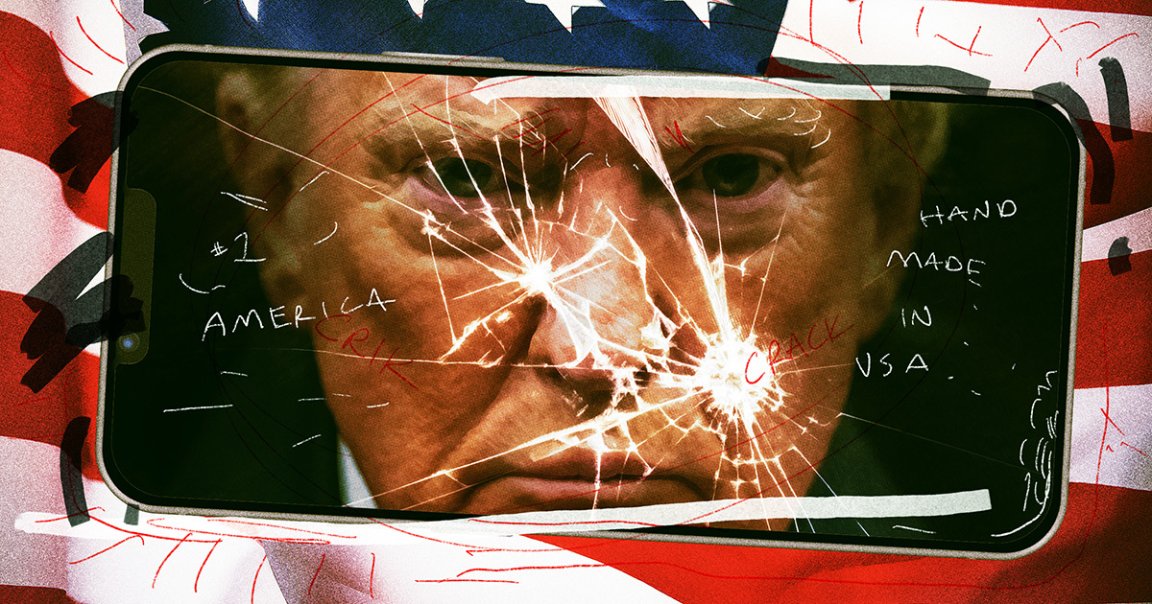
Smartphones are hard to make. Like, really hard. So hard, in fact, that Apple’s Tim Cook once admitted it takes 30,000 Chinese engineers overseeing some 700,000 workers just to make iPhone manufacturing economically feasible.
Though the US has no such labor force, let alone engineering capacity, Donald Trump and his band of minions keep insisting that we could bring iPhone manufacturing home. That seems to be the most coherent sales pitch behind Trump’s unprecedented tariffs, which many experts say could plunge the US — if not the rest of the world — into a self-inflicted recession.
Asked whether Trump thinks iPhone manufacturing could come to the US, White House press secretary Karoline Leavitt said “absolutely.”
“He believes we have the labor, we have the workforce, we have the resources to do it,” she answered. “As you know, Apple has invested $500 billion here in the United States, so if apple didn’t think the United States could do it they probably wouldn’t have put up that big chunk of change.”
Apple, for its part, hasn’t made any indication that it plans to start making iPhones in America anytime soon. That $500 billion investment, announced in February, includes a server manufacturing plant in Houston, and an expansion of the corporation’s TSMC Fab 21 silicon facility in Arizona, which it says employs 2,000 workers, but no iPhone plants.
Altogether, the Apple investment plans to add 20,000 jobs over the next four years — a drop in the bucket compared to the 275,000 government jobs cut by DOGE so far, not to mention the nearly 3 million jobs lost over Trump’s first term.
Trump’s Commerce Secretary, Howard Lutnick, is also carrying water for his boss’ wild tariff plans, saying that the “army of millions and millions of human beings screwing in little screws to make iPhones — that kind of thing is going to come to America.”
Regardless of whether Americans want those kinds of jobs — which Vice President JD Vance very recently compared to “slave labor” — there’s no reason to believe these tariffs will make that happen, given the costs of American labor and recent innovations in automation. Even Lutnick immediately issued a caveat: “it’s gonna be automated.”
Actually existing iPhone factories, meanwhile, rely heavily on globalized trade, which the US has long helped enforce. To make an iPhone, Apple sources parts and raw minerals from 200 suppliers across 43 countries, many of which Trump has now decided to tax.
Apple likewise relies heavily on China’s highly-organized economy and education system to turn out high-skilled workers, the latter of which is also a huge boost for the US.
“The skill here is just incredible,” Cook said at a 2017 conference in China. “In the US you could have a meeting of tooling engineers and I’m not sure we could fill the room. In China, you could fill multiple football fields.”
When it comes to manufacturing, the US has decades to go before it can ever hope to churn out iPhones, let alone at a price that can match China. Perhaps one industry analyst put it best: “[this] would be like me watching an NBA game, and being like, ‘oh it’s easy to score a basket.'”
More on iPhones: Apple Halts Disastrous AI System That Was Making Up Fake News Stories and Pushing Them to iPhone Users